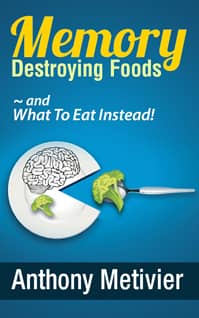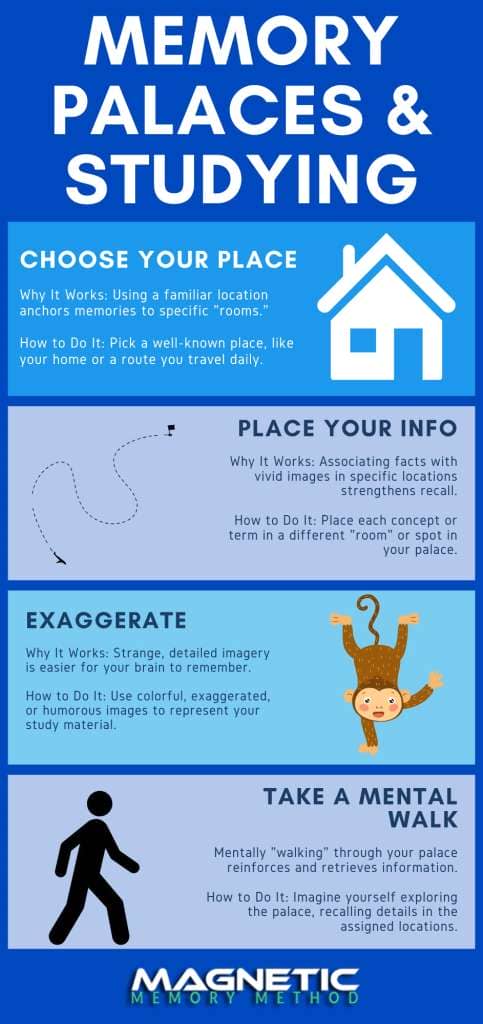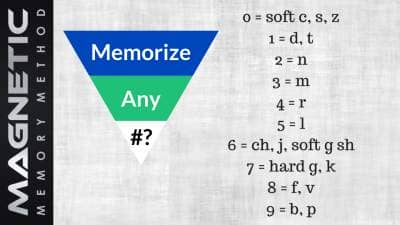Podcast: Download
Subscribe: Apple Podcasts | RSS

Who doesn’t?
After all, it’s the 21st century and there’s so much to learn!
Seriously:
There’s too much to study in too little time – especially before an exam.
But it’s not just a time issue.
It’s not just an issue of volume when it comes to so many books and videos to consume.
The core of the problem isn’t any of those things.
The core of the problem is memory…
The things that your brain just can’t memorize no matter how many times you repeat them.
Why?
Because you don’t have a strategy for managing your learning and memory.
But don’t worry!
In this article, I will show you 9 powerful techniques to help you remember what you study. You’ll learn everything far more easily – facts, dates, formulae, equations, whatever.
These techniques will make it far easier for you to ace your next exam.
How do I know? I used them all while completing my PhD at York University in Toronto. Then I used them again while preparing for the lectures I gave at several universities over the years.
So if you’re ready for my best tips, let’s dive in.
How to Improve Study Skills and Memory: 9 Powerful Tips
As we go through these suggestions, there’s no particular order of importance. They all matter.
But don’t overwhelm yourself.
Pick one or two study tactics at first. Then add more as you go.
1. The Memory Palace (My Top Recommendation)
Want just one simple method that helps you study and memorize?
Look no further than the Memory Palace technique.
What is it?
This memory technique was developed in Ancient Greece. It is sometimes referred to as the ‘Method of Loci’ or ‘Cicero Method.’ You might also hear it called the ‘Roman Room’ or the ‘Journey Method’.
Memory champions and experts all agree that it’s the most effective method to remember anything at all. In fact, one expert used the technique to memorize the value of Pi till nearly 112,000 digits.
My own student, Marno Hermann memorized Pi to 1200 digits using a Memory Palace. He recites them all for you in just over 10 minutes and in two different languages (!) on the MMM Podcast.
Although there are many variations, here’s the core of how it works:
- Choose a familiar location
- Place your information along a mental journey through the location
- Exaggerate the information by associating it with weird and wonderful mental imagery
- Take a mental walk to review each piece of information along the journey
With the Memory Palace technique, you associate each piece of information you want to memorize with parts of a location that you are very familiar with – such as your house or your school campus.
2. Acronyms to Improve Memory for Studying
Acronyms are the most commonly used memory technique and are great for remembering short lists or sequences.
You have probably learned ‘PEMDAS’ in school – a sequence for solving equations. It stands for Parenthesis, Exponents, Multiplication, Division, Addition and Subtraction.
Another common acronym to help you remember a geographical list of names is HOMES, which is used to remember the Great Lakes – Huron, Ontario, Michigan, Erie, and Superior.
Here’s a simple tip to create your own acronyms for remembering what you study.
According to the Cambridge dictionary, acronyms are constructed with the first letter of each constituent word and they actually sound like words. That’s what makes them easy to remember.
We also use acronyms in the Magnetic Memory Method training, such us:
D.O.C.
Doing is the Origin of Consistency
Doing is the Origin of Creativity
Doing is the Origin of Courage
Doing is the Origin of Clarity
Doing is the Origin of Control
To get into the “doing” of memory techniques that ultimately leads to control over your memory, all you have to do is S.I.P.:
Study memory techniques
Implement memory techniques
Practice memory techniques with information that improves your life
Then we have KAVE COGS to help us remember all the Magnetic Modes:
- Kinesthetic
- Auditory
- Visual
- Emotional
- Conceptual
- Olfactory
- Gustatory
- Spatial
Now, you might be wondering…
What do you do with these memorization techniques if the first letters don’t form a ‘word,’ because of a lack of vowels in the middle or any other reason?
Forget the definition and get creative.
Try changing the word sequence or using the second or the last letter instead of the first. If there is no vowel, pick up a second letter from a word. A common example is AWOL (Absent Without Leave.)
If you like acronyms, try combining them with the Memory Palace technique – and consider these different navigation techniques too. Since each acronym is a word, it’s easy to associate them with a specific object or location in your house. You can also use the pegword method. In combination with Memory Palaces, it will make any information you put into an acronym easier to remember.
3. Spaced Repetition for Memory Improvement
Here’s a well-known fact about memory – the more you reinforce something, the easier it becomes for your brain to recall it.
However, to improve memory for studying, when you reinforce something is far more important than how often you reinforce it. Sisti, Glass and Shors called this phenomenon the ‘spacing effect.’
In the spaced repetition method, you practice remembering at the right time. The simplest way to apply this memory method is to:
- Choose a method
- Apply active recall principles
- Adjust the difficulty as you go
- Repeat with other topics, including information you read just for fun.
Although you can find many software programs on the market, I suggest you use flashcards when you study.
While going through your flashcards, experiment with dividing them into three bundles. If you remember something clearly, those cards go into the ‘Easy’ pile. You don’t have to study those flashcards again for a week or two.
If you only moderately remember something, keep it in the ‘Medium’ pile and revisit it after a few hours or a day. And if you cannot remember something at all, place it in ‘Hard’ and study it again within the next 10 minutes.
This is an incredibly simple way to study effectively, and yet proven by many scientific studies like this one. The best part is that you can combine spaced repetition software with the mnemonic devices you’re learning about on this page.
And if you’re in the Magnetic Memory Method Masterclass, you’ll know how to combine the cards with the Memory Palace.
In brief: Anytime you have words that are ‘Medium’ or ‘Hard’, include them in a Memory Palace.
Then, use all of the Magnetic Modes to create Magnetic Imagery that helps you remember the target information. That will make the information on your cards far easier to recall.
4. The Major System for Memory Improvement
Want an effortless way to remember numbers for studying – in history, maths, physics, etc.?
Use the Major Method, also called the Major System or Harry Lorayne’s Number Mnemonics. Geeks also call it the phonetic mnemonic system and digit-consonant system.
Quite a mouthful! So, let’s just stick with the ‘ Major System’ to keep things simple.
Here’s how it works.
In the Major Method, you associate each number with a sound, typically, a consonant. Here’s the system most people follow:
0 = soft c, s or z
1 = d, t
2 = n
3 = m
4 = r
5 = l
6 = ch, j or sh
7 = k
8 = f or v
9 = b or p
The first step is to memorize these associations between numbers and letters. Then use these associations to form words from numbers.
For instance, 22 could be “nun” (n+n)
54 could be “liar” (l+r). Personally, I think of Jim Carrey in the movie “Liar Liar” playing a lyre to help make this number even more memorable.
To remember longer sequences of numbers, you need to combine the sounds you have made. If you want to remember the number 2254, you could visualize a nun punching Jim Carrey for lying!
Make the image as animated and ridiculous as possible, and it will stick in your mind!
If you can, create a fixed image for every number from 0 to 99. That will make it easier to combine them to remember longer sequences of numbers used in mathematics, physics, chemistry or engineering.
If that sounds like a lot to you, just associate a fixed object for each number from 0-9.
If you want to take the Major Method further, check out this article about how to combine it with the Memory Palace Technique.
5. Improve Your Focus to Improve your Memory Storage
How often do you get interrupted when you study?
Texts, app notifications, YouTube, Netflix or just a noisy room – students face dozens of distractions and interruptions every single hour.
These factors make it close to impossible for you to reach a high level of concentration – which is terrible news if you are trying to improve memory for studying.
Researchers from MIT have found that it’s easier to form a long-term memory when your mind pays close attention to a task. You will have to minimize distractions from devices or people around you if you wish to remember things better.
Here are a few ways:
- Mute all notifications when you study. If you have an iPhone, just activating the ‘Do not disturb’ mode will do the trick.
- Try to isolate yourself from people you know while studying. Go to a library or a café where you won’t be disturbed.
- Practice meditation for just a few minutes a day. Research (Maclean et al. 2010) has indicated that just basic meditation helps us focus far better.
- Use app blockers like to block distracting websites while studying.
- Work on one topic at a time and avoid multitasking and switching tasks.
The flip side of removing interruptions is to invite scheduled breaks.
There’s actually scientifically proven process called interleaving that helps you strategically take breaks in ways that typically helps your brain form memories faster.
6. Lifestyle Changes to Improve Cognitive Function
Your lifestyle – your food, sleep and activity levels have a significant impact on your memory.
Sleep
Most students try to gain more time to study by skipping out on adequate sleep. It just makes things worse because lack of sleep affects memory as well as several other cognitive abilities.
Several studies by Diekelmann and Born have shown that sleep helps in procedural memory formation, learning and creativity. In fact, sleep deprivation can even make you remember things incorrectly.
Eight hours is ideal, but at least make sure you get seven hours of sleep every night.
And don’t fall for the idea that binaural beats will help you improve your memory while sleeping. Chances are that will just make you tired and forgetful.

Food
Foods abundant in saturated fats and trans fats such as red meat, butter, etc. are quite damaging to learning and memory. Students also tend to eat a lot of junk food (especially during exam time) which are worse for your brain.
Numerous studies have shown that these foods can even lead to Alzheimer’s disease in the long-term and other conditions that damage brain health and cause memory loss.
Instead, to improve your memory power for learning, try to have more of fish, olive oil, whole grains, walnuts, blueberries. There are also other foods that fall in the ‘Mediterranean diet’ that are excellent for your brain.
Exercise
Exercise is well known to improve cognitive performance in several ways such as improved mood, better concentration, more alertness, etc.
So, it’s naturally very effective for improving memory. Exercise also causes the release of a protein called cathepsin B in the brain. This stimulates the growth of neurons (brain cells) and forms additional connections in the hippocampus – an area of the brain vital to learning and long-term memory.
7. Recall Before Writing
Teachers encourage us to write things down to remember things better. Adding a couple of steps to this process can make a vast difference to your ability to learn and memorize things quickly – especially before an exam.
First, recall and mentally repeat what you have to write down rather than just copy it mechanically. You can even use movies and TV series as I discuss in how to improve memory using these tools
This process isn’t difficult to do because the information will stay in your short-term memory for around 10-20 seconds if you have paid attention. And mentally recalling it right then gives you an excellent way of transferring the knowledge from your working memory (short-term memory) to your long-term memory.
Next, take a few seconds to store that piece of information in your Memory Palace. That will consolidate that memory even further.
8. Warm Up Your Brain
I used to make a major mistake.
When it was time to study, I would dive into my textbooks cold.
However, I eventually discovered that I get much better results when I warm up my brain using specific routines.
These can be as simple as focusing on the breath, going for a walk and practicing mindfulness as you observe the environment.
Or you can do quick critical thinking or creativity exercises. Partly, I got the idea from this scientific study which shows a connection between creativity and better learning outcomes.
I also noticed that it was easier for me to remember various facts from my studies if I spent a few moments memorizing playing cards.
It’s also useful to spend a few minutes visualizing. If you’re using the Memory Palace technique for studying in the way we’ve been discussing, you’ll already be doing this activity frequently.
On the other end of studying, I’ve found it helpful to cool down as well by meditating for a few moments. I’ll do that either at home or while out for a walk.
9. Study With Your Peers
Far too many people make studying an isolated activity.
That’s good for some people.
But I’ve found so much growth and better memory from discussing what I’m studying with lots of other people.
When I was an undergrad, I met almost every week with my fellow students. I even became the president of the English Undergraduate Student Association so I could regularly meet with other learners.
Later, in grad school, there was so much to read. I got into a study group where we took turns presenting books and articles with each other.
We still had to read each text on our own, but hearing quick presentations from one another primed the mind. It made challenging material much easier to read and remember from later.
Are You Inspired To Try These Memory Techniques To Remember What You Study?
Out of all these techniques, the Memory Palace happens to be the most effective and versatile method. You can easily combine it with other techniques to build an excellent memory. To learn the Magnetic Memory Method at no charge, get started by enrolling in “Memory Palace Mastery in 8 Steps”:
And let me know in the comments below:
Which of these ways to improve memory for studying are you going to try today?
Related Posts
- Memory Loss Story And Memory Recovery Tips With Jennie Gorman
Memory loss is frightening. However, the solution may be simpler than you think. Jennie Gorman's…
- Memory Loss Story And Memory Recovery Tips With Jennie Gorman
Memory loss is frightening. However, the solution may be simpler than you think. Jennie Gorman's…
- Memory Loss Story And Memory Recovery Tips With Jennie Gorman
Memory loss is frightening. However, the solution may be simpler than you think. Jennie Gorman's…










24 Responses
Thank you for pointing out that one way to remember what the person has learned is the memory palace technique and that it is done by associating what the person wants to memorize with something that they already know. I usually do that, but I never thought that it is actually a strategy to remember what I’ve learned. At least, now I know that I am on the right track. I feel much more confident attending that training that my boss wants me to attend.
It’s great to know that this helped you, Tatiana. Thanks for taking the time to post! 🙂
Thanks, really helped. 🙂
That’s great to hear. Thanks for taking a moment to le me know.
Thanks for sharing to improve memory for studying. Great to hear that Memory techniques are tools that help people retain what they have studied. I think these techniques will help students excel in school. Moreover, they are also useful in other extra-curricular activities like quizzes, games, puzzles etc. As a parent, I’ll definitely tutor my kids on this also share above tips to memorized learning.
Thanks for your post, Tina. Yes, these are great techniques for students of all ages.
I am preparing for an upcoming examination. Then I found your blog. Thanks for sharing this article. This will definitely help me in the preparation of my exam.
Glad you found this post, Dipak. It will indeed help you a great deal and make completing the exam a lot more fun too!
This will undoubtedly help me so much!
That’s great, Anne. Thanks for letting me know you found this post useful!
Thank you so much for sharing this. I am preparing for a major exam, and it has been a struggle to remember so much information. I am definitely going to try this.
Thanks for letting me know you appreciated this, Shiwali.
Dive in and if you have questions, let me know, ideally with a Memory Palace drawing and some discussion of what you’ve been doing on your own to make progress.
Thanks again and look forward to your next post on the MMM blog! 🙂
Thanks for sharing this article. These tips will definitely help me in my exam preparation.
That’s great, Dipak. Thanks for letting me our community know you found this post useful!
Thanks it’s very helpful. But there are few people who possess great memory from birth. I read about Kim Peek who was disabled person but had exceptional memory.
My pleasure, Annu.
Rather than focus on what other people have experienced, I encourage each person to focus on their own unique mind and situation. The world already has (or has had) the other people like Kim Peek.
Let’s worry about making YOU the best possible version of yourself you can be. How does that sound?
Hello Anthony,
I just read your article about improving memory and it’s really great.
But I have a question: Can we improve memory by drinking enough water a day?
What do you think?
Thanks for your question, Ali.
Yes, there is good evidence showing that drinking more water helps with memory improvement.
Generally, this is said to have to do with how dehydration shrinks your brain. But when we drink enough, our brains grow in size and more blood flows through it.
I’ll look more into the science around this soon, but for now, it’s often said by critics of memory supplements that most of them only improve verbal memory by about 1%. A simple glass of water apparently can do exactly that without the need for anything else.
Of course, very wise people invest time into brain exercise and memory training so that all levels of their memory are ready for action. That’s the best choice.
Thank You For the most informative content.It helps a lot✌️
That’s great to hear, Nehal.
Is there anything further I can help you out with?
Thank you for this post Dr. Anthony. I am glad I found it. I learned a great deal of value while reading.
Thanks for checking this one out, Jessica. I’m glad it delivers! 🙂
Anthony, I love all these methods for studying. I’ve used most of them in my years of studying Chinese. Just one I can’t agree with … since I changed my diet to loads of saturated fat and red meat, I have found it so much easier to remember characters!! It’s really amazing.
Diet is ultimately a personal thing. I do lots of experiments with mine and it’s great that you’ve found a means of using diet to help you learn better.